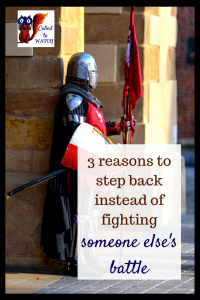I have to admit, I have a tendency to get caught up “in the moment”. With the adrenaline rushing through my veins, I find it only too easy to believe that my right is the only right and it needs to be defended at any cost.
Of course, this just gets more complicated when it’s not my own battle that I’m fighting.
As Watchers we are often called to fight on someone else’s behalf. But what if sometimes fighting is not the best course of action? What if sometimes the right thing is to step back and put down our arms?
How are we to know?
For a definition of ‘battle’ in this context, see my previous post: How to fight someone else’s battle when you don’t want to.
When not to fight someone else’s battle:
There are situations in which we are not being called to ‘do battle’ for someone else – even if it looks like they need it! Protectiveness can be misplaced, especially when:
1 : It causes harm to our Loved One
I think ‘harm’ will look different in every situation. It might be relieving them of their autonomy. It might be fighting for something we only think they care about. It can even be fighting for something that in itself is ‘wrong’ or spiteful.
There is a time for dependence and a time for autonomy, a time for listening and a time for overriding someone’s wishes in love. The best way to make decisions likes these is in community, by your Loved One’s side.
2 : We’re fighting primarily for our own interests
I don’t think there’s many of us who can deny that there is a certain ‘glory’ in fighting on another’s behalf. It can easily make us feel ‘all heroic’ and, (sometimes even more important) it can make us certain that for once we are doing the ‘right thing’.
Yet if we’re fighting to make ourselves feel better or more in control, we need to ask some serious questions.
3: We’re not trusting God or others
There’s a time to fight, but there’s also a time to step back and let others stand up. Sometimes when we barge around killing all the dragons, we prevent others from expressing their love for our Loved One.
Likewise, we need to ask ourselves whether we are fighting because we don’t trust God to fight on our behalf. Are we asking Him to work through us, or are we trying to work instead of Him?
Is this your time to stand up, or should you leave it for someone else?
How to test your motives for fighting
One way to check whether you are fighting for genuine reasons is to step back.
This will not be applicable in every situation, but often there are small battles in which you can take the back seat. We are not called to be in the front line in every war.
How do you feel playing a supporting rather than ‘fighting’ role? Does it hurt your pride? Is someone else stepping up – or are you needed?
Expectations and challenges change depending on the season – what sort of season are you in?
Do these ‘small’ battles need to be fought?


How to practice not fighting your Loved One’s battles
Perhaps you’ve realised that you have the tendency to unnecessarily leap into the throes of combat with both guns blazing. Well, how do you prevent yourself from this? A few things you can do are:
- Pray for right motives and God’s power to see yourself clearly
- Verbally remind yourself and your loved one that it is God who goes before us and all victory comes from him and not our efforts
- Ask someone else to do something you are quite capable of doing – and practice taking the back seat
- Question whether you should be on this or that battlefield. Don’t assume you should be fighting in every situation and every moment. Ask instead: Why am I here? Am I seeking to love or appease my ego?
- Practice listening to what your Loved One is doing or saying. This can be easy to overlook when you just want to take action and make everything right.
Be prepared to lose a battle or two
Winning is not everything. Even if you have the purest motives and the most just cause, you don’t have to fight.
I’m not saying you should stop phoning up that medical supply company to ask them about your orders and simply let your Loved One suffer instead.
I’m simply saying… pick your battles.
Not all need to be fought. It’s okay to lose sometimes. It’s okay for people to maintain their mis-conceptions at times. It’s okay for situations to be harder than they need be. It’s okay to let someone else handle something less capably than you could have.
It’s not ideal… but it’s okay. This world is not ideal, and sometimes the price for victory is too high.
Sometimes it’s better to lose while trusting God and your Loved One, than to win and paint yourself the saviour of the story.
Is fighting to take the easiest path worth it, if it comes at the expense of loving your neighbour?
Winning is not everything – Love is.
A final note: As Christians we have hope in the aftermath of defeat, as well as in victory. We have Jesus who is going on before us, we have a Father in heaven preparing perfection for us.
Most of all, we have the promise that God will “work all things for the good of those who love Him.”
// Do you find ‘stepping down’ from a battle difficult? Why do you think that is?
PS: Enjoyed the post above? Get the next one delivered straight to you! Sign up for email notifications
I’m also on Facebook, Pinterest, Instagram & Twitter! Meet me there for more interesting reads, resources and community.


Dear Emily,
Thank you so much for your posts (ok so far I have only read the front page and this one, but I hope to read more later today). Your definition of a watcher has helped me figuring out some things about my own life; and why I feel a nudge to often step up for others. Growing up I was living in the constant tension of helping care for my grandma (who ended up in a wheelchair when I was 12) and at the same time being the lonely outsider at school. Here I was supporting someone else, yet no-one seemed to come to my side or cared about I felt.
Having lived with several people since that time that have been / are suffering from either physical issues or emotional (like depression), I often find myself wanting to fight their battles. I think mostly it is because I don’t want them to hurt, yet, I think it is also that it hurts ME, too, to see them suffer or be misunderstood.
I think sometimes we might be fighting a fight because we want to be the friend, we ourselves didn’t have / don’t seem to have, and it is easier to fight for someone than face the reality of our own hurt and helplessness.
In any case Jesus is bigger than any and all battles we might want to fight, so maybe we can just be there and love.
(Also, your blog is inspiring me to write more on my own…Blessings!)
Hi friend! Thank you so much for your encouraging comment. It means a lot to know this blog has helped you – may your writing likewise help you and others!
I love what you said about it being harder to sit with our helplessness and lean on God. It is so hard! But so worth it 🙂